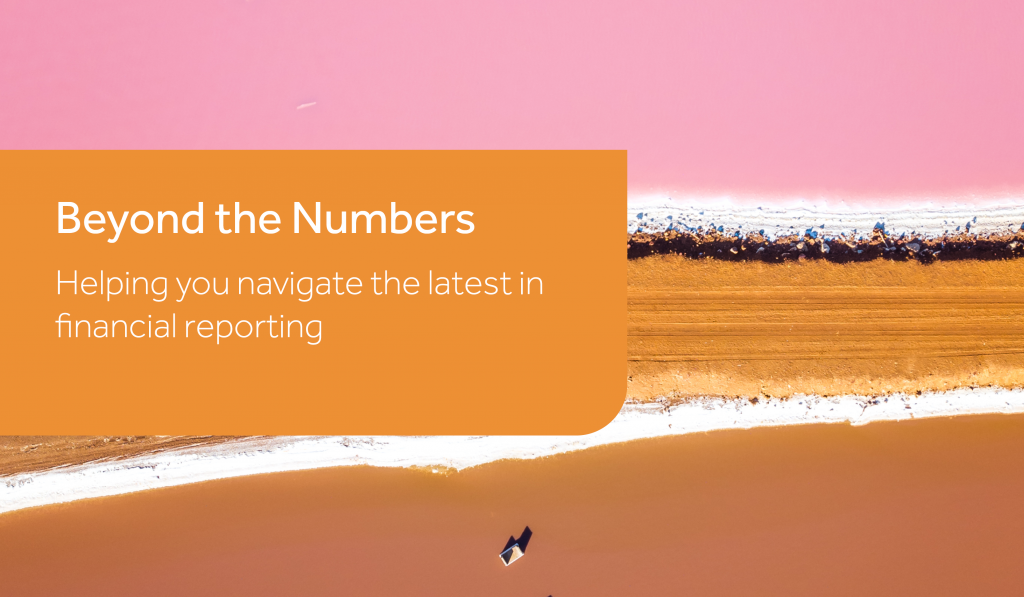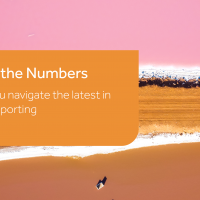Welcome to Beyond the numbers, our monthly newsletter which brings you a summary of the latest developments from domestic and global standard-setting bodies and regulatory authorities.
Top Story
2025 Financial Reporting update webinar
Registrations are open for Nexia Australia’s 2025 Financial Reporting Update webinar which will be held on Thursday, 29 May 2025 at 11:00am – 12:00pm AEST.
Join our specialists as they explore the key financial reporting changes for 30 June 2025, including developments in the not-for-profit sector, and key elements of mandatory sustainability reporting and how companies will be affected.
AASB agenda papers – May 2025
The AASB agenda papers for its meeting held on 1 May 2025 are available. Among other items, the Board will discuss stakeholder feedback received on the following:
- Tier 3: Not-for-Profit Private Sector Financial Reporting Framework
- Application of AASB 18 Presentation and Disclosure in Financial Statements by Not-for-Profit entities and superannuation entities
- Post-implementation review – Leases
The Board will also consider:
- the sustainability project plan and related resources
- a review of AASB 1060 to assess potential amendments arising from recent changes to IFRS for SMEs and AASB 18
Regulations
Deductible gift recipients and the ACNC
Organisations that are endorsed as deductible gift recipients (DGRs) are entitled to receive donations that are deductible from the donor’s income tax. Not all charities are eligible for DGR status.
The Australian Charities and Not-for-profits Commission (ACNC) has issued a fact sheet explaining the eligibility criteria and how a charity applies for endorsements as a DGR.
Scam alert: Beware of fake ASIC Connect websites
The Australian Securities and Investments Commission (ASIC) has warned that scammers are creating fake websites resembling its official ASIC Connect portals -asicconnect.asic.gov.au and connectonline.asic.gov.au – to steal personal information. These counterfeit sites may display fake company details or links to legitimate ASIC pages to appear credible.
To protect yourself:
- Always verify you’re on a legitimate ASIC website before entering any personal information.
- Manually type the web address or use trusted bookmarks.
- If you encounter a suspicious site, report it to ASIC via their online inquiry form.
New portal for AFS license holders
ASIC launched a new portal for Australian financial services (AFS) licensees. The portal will streamline applying for, varying, and cancelling licenses, featuring tailored questions and pre-filled information to improve efficiency.
This upgrade is part of ASIC’s RegistryConnect program, aimed at modernising its systems and enhancing the user experience for licensees.
Queensland Treasury
Queensland Treasury released the latest edition of its Financial Accountability Handbook, which covers reporting requirements under the Financial Accountability Act 2009, the Financial and Performance Management Standard 2019, and the Financial Accountability Regulation 2019.
The Handbook consists of six volumes: Introduction, Governance, Designing internal controls, Monitoring/assessment, Reporting systems, and Grant management.
The Handbook aims to help agencies develop and maintain a strong framework for the financial management of their agency.
Sustainability
Understanding AASB S2 Climate-related Disclosures
Nexia Australia has released its publication describing the key disclosure requirements of AASB S2 Climate-Related Disclosures and the phased assurance implementation timeline for those disclosures.
This publication should be read in conjunction with our publication Mandatory Climate-related Disclosures Legislation Passed which describes which entities are required to mandatorily apply AASB S2, the timeline for adoption, group reporting and alternative reporting requirements for Group 3 entities that have no material climate-related financial risks and opportunities.
AASB | Sustainability knowledge hub
The AASB has created a resource page and published the first set of materials to assist preparers of climate-related financial disclosures using AASB S2 Climate-related Disclosures.
As of its release, the page includes frequently asked questions such as: What information needs to be disclosed? How does AASB S2 compare to IFRS S2? Who is monitoring compliance with Australian Sustainability Reporting Standards?
The Board will add new resources to this page over time.
Exposure Draft on amendments to greenhouse gas emissions disclosures
The International Sustainability Standards Board (ISSB) has issued an Exposure Draft of narrow scope amendments to IFRS S2 Climate-related Disclosures.
The ISSB’s proposed changes address identified application issues including:
- relief from measuring and disclosing Scope 3 Category 15 greenhouse gas (GHG) emissions associated with derivatives and some financial activities;
- permit the use of alternative Global Warming Potential (GWP) values that are not from the latest Intergovernmental Panel on Climate Change (IPCC);
- provide jurisdictional relief allowing the use of methods other than the Greenhouse Gas Protocol to measure GHG emissions; and
- permit alternatives to the Global Industry Classification Standard (GICS) when disaggregating financed emissions by industry in certain circumstances.
The ISSB Exposure Draft is open with a 60-day comment period closing on 27 June 2025.
ISSB Board Meeting – April 2025
The ISSB met on 9 April 2025 to discuss a summary of findings from the first phase of its research project on additional sustainability topics including biodiversity, ecosystems, and ecosystem services (BEES), and human capital. The ISSB was not asked to make any decisions.
A podcast episode summarising the highlights of this meeting is available on the IFRS website.
Sustainability education materials
The ISSB released additional education material to support first-time preparers of climate-related disclosures.
Episode 9 ‘Ramping up systems and processes for sustainability data’ of its webinar series explores how companies are adapting or creating new systems and processes to collect, manage, verify and disclose high-quality, reliable data.
IFRS developments
IASB Board Meeting – April 2025
During its April 2025 meeting, the International Accounting Standards Board (IASB) discussed several key topics. The primary focus was on the standard-setting project concerning Business Combinations – Disclosures, Goodwill and Impairment. The IASB will continue these discussions in future meetings.
The Board also approved the IFRS Interpretations Committee’s (IFRIC) agenda decisions, including guarantees issued on obligations of other entities, recognition of revenue from tuition fees (IFRS 15), and recognition of intangible assets from climate-related expenditure (IAS 38).
The IASB considered 10 other agenda decisions previously published by IFRIC that include references to requirements in IAS 1 that will be superseded by new or amended requirements in IFRS 18. The Board requested IFRIC to consider making amendments to those agenda decisions to ensure conformity with IFRS 18.
A podcast summarising the highlights of the meeting is available on the IFRS website.
Going concern assessment
The International Auditing and Assurance Standards Board (IAASB) has released the revised International Standard on Auditing (ISA) 570 Going Concern. This revision enhances auditors’ responsibilities in evaluating management’s assessment of an entity’s ability to continue as a going concern.
Key changes include more robust risk assessments, extended evaluation periods, and improved transparency in auditor reporting.
As a result, auditors will require companies to provide more detailed analysis and documentation, including financial health analysis and cash flow projections, to support management’s assessment regarding going concern.
The revised ISA is effective for audits of financial statements for periods beginning on or after 15 December 2026.
In case you missed it
Sustainability Reporting – Regulatory Guide
ASIC issued Regulatory Guide RG 280 Sustainability reporting on 31 March 2025.
The Guide addresses the preparation and content requirements of sustainability reports, and ASIC’s role in administering and enforcing these obligations. It explains how ASIC will exercise its specific powers under the Corporations Act 2001, how ASIC interprets the law and the principles underlying ASIC’s approach.
The Guide also addresses how sustainability reporting might affect small businesses that are within the value chain of a large business or institution.



